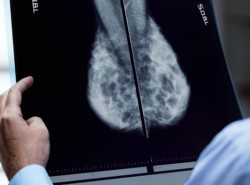
Development of a 3D culture model of triple negative breast cancer that mimics reality
Published: 10/9/19 1:48 AM
Laura Bray
Triple-negative breast cancer accounts for approximately 15 per cent of all breast cancers, and they are challenging to treat because they are typically more aggressive and don’t respond to current treatments.
Much of the underlying biology that increases cancer risk is unknown and as such, reliable biomarkers that would help with diagnosing early stage, high risk triple-negative breast cancer patients have not yet been identified.
One key factor in the fast progression of triple-negative breast cancer is a high level of vascularisation – when the tumour develops blood vessels such as capillaries and veins. This vascularisation process is a precursor to the tumour spreading to other parts of the body (metastasises).
New promising treatment methods are arising that focus on targeting the vascularisation process for many types of breast cancer, however, it is still poorly understood for triple-negative breast cancer. A better understanding of the biological mechanisms involved could result in potential prognostic markers or new therapies for breast cancer patients.
The process for testing our understanding of how cells interact is to culture them in a petri dish. However, experiments on cells in petri dishes do not accurately mimic the natural human tissue environment and cannot represent the progression of breast cancer in the human body.
In order for researchers to obtain useful results from laboratory cell culturing, they need to be able to replicate the breast environment as closely as possible. In this project, to properly understand the cellular interactions in triple-negative breast cancer that control its vascularisation and metastasis, Dr Laura Bray and her team aim to upgrade the existing practice in culturing tumour cells by developing a more sophisticated, three dimensional culture technology to create experimental models that better reflect real breast cancer interactions, and have greater clinical relevance.
The study will also seek to identify key biomarkers that can predict the response to breast cancer therapy, and develop a model system to test patient biopsies which would help determine if the patient’s cancer is likely or unlikely to develop into metastatic form of triple negative breast cancer, and to individualise their treatment program.
